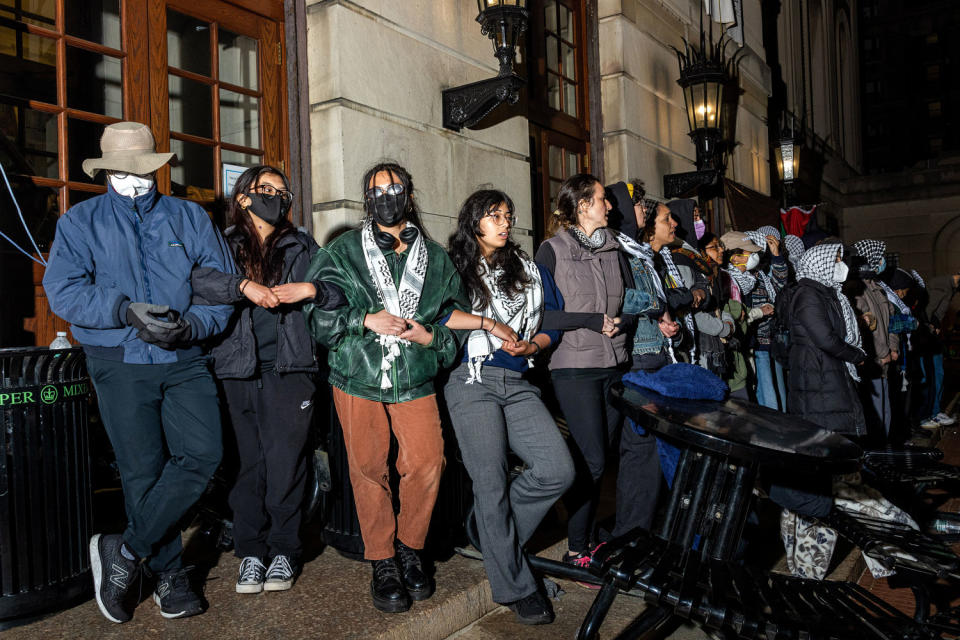Columbia University radio station WKCR praised for live broadcast of college protests
As the New York Police Department raided Columbia University’s Hamilton Hall on Tuesday night to arrest pro-Palestinian protesters camped inside, there was one outlet that many onlookers turned to for live updates: WKCR.
Listenership of WKCR was so high that night that its website crashed. The website was still experiencing intermittent outages as of Wednesday afternoon.
The radio station is one of several student news outlets across the country — including The Columbia Daily Spectator, UCLA’s The Daily Bruin, USC’s The Daily Trojan and UT Austin’s The Daily Texan — that have become go-to sources for information about protests at college campuses.
On Tuesday, reporters from mainstream media outlets had their access restricted by Columbia, so student journalists used their unique positions as members of the community to report on the event. Elsewhere across the U.S., journalists at national and local outlets have also said they’ve been turned away from some campuses if they didn’t have college IDs.
As a result, many following along online have turned to students — many who are juggling classes or finals and reporting nonstop amid a barrage of breaking news impacting their communities.
On Tuesday, many listeners of WKCR — including The Daily host Michael Barbaro — commended the students for their work, calling the future of journalism bright.

Nearly 100 people were arrested after police raided Hamilton Hall, according to the NYPD. Columbia University President Nemat “Minouche” Shafik had sent a letter to the NYPD on Tuesday requesting help in clearing the protesters from the building. Columbia students, as well as those in other universities across the country, have been calling on their schools to divest from all financial support of Israel.
Columbia has a long history of student activism. The occupation of Hamilton Hall was reminiscent of students’ takeover of the same building in 1968 to protest the Vietnam War. WKCR was also an instrumental source for live updates on campus during that time.
The student journalists at WKCR did not immediately respond to a request for comment.
In their broadcast on Tuesday, WKCR journalists said they faced difficulties in reporting on the raid despite their access to the campus. Some reported that they were prohibited from exiting Pulitzer Hall, or else they risked being arrested. Other WKCR staff that were outside of the building were reportedly restricted from entering for hours.
At times, they disputed claims made by public officials.
New York City Mayor Eric Adams said on Wednesday that while there were students involved in the occupation of Hamilton Hall, the protesters were “led by individuals not affiliated with the university.” He did not specify how many students and non-university affiliated officials NYPD believed were involved in the protests.
WKCR reporter Alejandra Díaz-Pizarro said during Tuesday’s broadcast that “many” of the outlet’s sources “confirmed that the people on those buses were students.”
“These are people who have seen these students in classrooms, people who have seen them on campus, that have perhaps lived on the same dormitory floors and so on,” she said. “I’m sure it brings no joy to students to be reporting on their peers being loaded into NYPD correctional buses and any implication that the occupiers of Hamilton Hall were not students is a serious knock on the students ability to recognize and see their own peers.”
The journalists also documented the hurdles they faced — reporting on what they described as a lack of communication between the university and the community regarding the deployment and retention of police presence on campus for the rest of the academic year.
As they shared live updates, the journalists appeared candid about the emotional and physical toll that covering the protests and the administration’s response had on them.
Georgia Dillane, program director at WKCR, previously told Mother Jones about the unique challenges that the team has faced in covering the protests.
“I think I speak for a lot of the people here and that we’ve never done something like this to our bodies and to our souls,” Dillane told the outlet. “And so that has been something that has been challenging, just like understanding, like balancing the intense motivation we have to bring this coverage out into the world, but also recognizing that there are limits to what we can handle.”
On Wednesday morning, the station released a statement on social media announcing that it would be “maintaining reduced coverage of the situation on campus starting tomorrow.”
“While we will be taking some much-needed physical and emotional recuperation, our staff continues to be paying attention to developments on and around campus, and we are prepared to report on them as necessary,” the statement read.
Columbia Journalism School Dean Jelani Cobb reportedly sent a memo commending the work of the student journalists.
Cobb did not immediately respond to a request for comment.
“We believe that journalists have a fundamental right to cover the news,” the note, which was widely shared on X, stated. “Your efforts turned those sentiments into reality.”
This article was originally published on NBCNews.com

